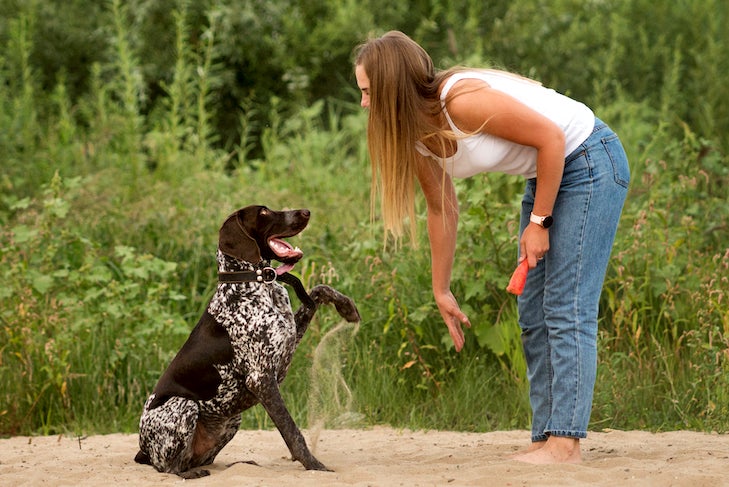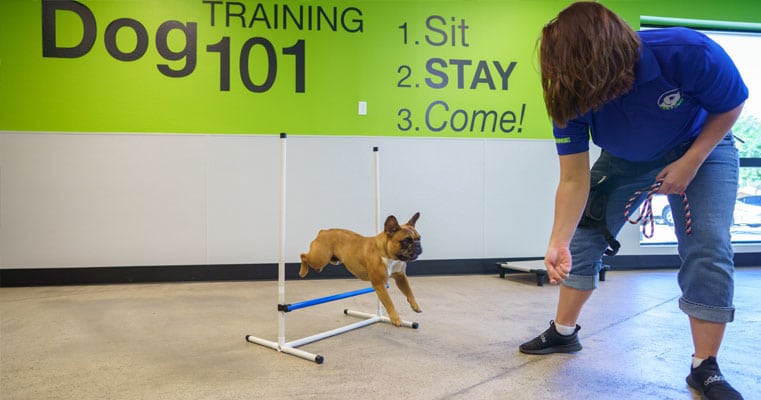Unlock Your Pet's Possible: Proven Dog Training Strategies for Success
Efficient canine training is a nuanced process that rests on comprehending canine actions and using medically backed approaches. Dog training. By incorporating positive reinforcement, establishing clear commands, and prioritizing socialization, dog proprietors can grow an effective partnership with their pet dogs. Difficulties typically occur that require customized remedies and an individual technique. Checking out these proven methods discloses not just the capacity for behavioral renovation however likewise the deeper bond that can be created in between owner and pet. What crucial methods must be thought about to truly open your pet dog's potential?
Recognizing Pet Dog Behavior
Comprehending dog habits is important for reliable training and promoting a favorable relationship in between dogs and their proprietors. A comprehensive understanding of canine body movement, vocalizations, and social communications is essential for identifying their needs and feelings. Pet dogs communicate primarily through non-verbal cues; as an example, a wagging tail may show excitement, while pinned ears can indicate anxiety or submission.

Furthermore, environmental factors play a significant role fit a pet's actions. Adjustments in routine, new surroundings, or the presence of strange people can cause tension or stress and anxiety in dogs. Recognizing these triggers makes it possible for proprietors to alleviate unfavorable reactions and create proper training methods.
Inevitably, a deep understanding of pet dog habits lays the foundation for effective training techniques, improving both actions and the general bond between the pet and its proprietor. dog training near me. This knowledge is crucial for promoting a well-adjusted, pleased canine friend
Positive Reinforcement Methods
Effective training counts heavily on favorable reinforcement techniques, which have actually been shown to produce significant cause shaping preferred behaviors in pets. This technique involves awarding a dog for displaying specific habits, thereby raising the possibility that these actions will be duplicated. Rewards can take different kinds, including deals with, appreciation, toys, or play, depending on what inspires the specific canine.

It is necessary to slowly phase out rewards as the pet discovers the behavior, transitioning to recurring support. This technique maintains the actions in time while preventing dependence on continuous rewards. By concentrating on positive support, fitness instructors can cultivate a relying on connection with their dogs, advertising a cooperative and healthy and balanced training atmosphere that enhances general obedience and performance.
Developing Consistent Commands
An essential aspect of effective dog training is the facility of consistent commands. Consistency in commands is crucial for efficient communication between the trainer and the pet dog. When commands are consistent, canines find out to associate certain words with desired habits, which increases the training process and improves understanding.
To develop consistent commands, it is crucial that all member of the family make use of the same terms and motions. For instance, if one person makes use of "sit" while one more states "rest down," Check Out Your URL it can create confusion for the pet dog. Select clear, distinct words for commands and guarantee everybody associated with the dog's training abides by these options.
In addition, rep is key. Strengthen commands with regular technique, ensuring that the dog gets sufficient chances to react appropriately. When a pet successfully adheres to a command, prompt favorable support needs to follow. This could be in the form of treats, praise, or playtime, solidifying the link in between the activity and the command.
Finally, be client. Establishing consistent commands takes time and initiative. With commitment and clearness, you will help your pet create a strong understanding of expectations, ultimately bring about a mannerly buddy.
Socialization and Direct Exposure
Mingling a pet dog is important for fostering a positive and well-adjusted companion. This procedure involves exposing your dog to a selection of atmospheres, people, and various other animals to create their social abilities and adaptability. Early socializing, ideally in between the ages of three to fourteen weeks, is training a dog to be a therapy dog essential, as it prepares for a pet dog's future behavior.
Throughout socialization, purpose to offer favorable experiences in various settings, such as parks, hectic streets, and homes basics with other pets. Present your dog to different stimuli, consisting of sounds, sights, and scents, making sure that each experience is satisfying. This direct exposure assists minimize worry and anxiousness, paving the means for a more durable dog.
Taking part in regulated group play sessions with various other pets can likewise boost social skills, instructing your pet dog suitable communications and borders. Always check your dog's comfort degree throughout these experiences, gradually boosting direct exposure as their confidence grows. Bear in mind, the objective is to create an all-round pet dog that flourishes in diverse scenarios, advertising a harmonious relationship with both people and various other pets. Focusing on socialization will considerably add to your pet's total happiness and behavior throughout their life.
Overcoming Common Training Challenges

Dogs may have a hard time to concentrate in unknown or active settings. Gradually desensitize your canine to disturbances by beginning training in a quiet atmosphere and gradually presenting even more stimulations as they become proficient.
Furthermore, behavior concerns like jumping or excessive barking can end up being discouraging. Address these by educating different actions, such as resting comfortably when welcoming guests. Uniformity and persistence are essential; reinforce desired actions constantly and stay clear of abuse, which can lead to confusion.
Lastly, recognize that each dog is unique, and training timelines may vary. Tailor your approach to your dog's individual demands, and look for specialist advice if essential. With willpower and the ideal approaches, getting over these difficulties can cause a well-trained, pleased canine companion.
Conclusion
Finally, opening a pet dog's prospective necessitates a comprehensive approach that includes an understanding of canine habits, the application of positive reinforcement strategies, and the facility of consistent commands. Early socialization and direct exposure to diverse environments better improve a canine's adaptability and self-confidence. By attending to common training obstacles with tailored strategies and perseverance, a unified and cooperative partnership between dog and trainer can be fostered, inevitably leading to a well-behaved buddy capable of growing in different scenarios.
Efficient dog training is a nuanced process that pivots on comprehending canine behavior and utilizing scientifically backed methods.Understanding pet dog behavior is necessary for effective training and cultivating a positive connection in between canines and their proprietors.Effective training depends greatly on positive support strategies, which have been revealed to generate considerable outcomes in forming desired habits in dogs. When commands are uniform, pet dogs learn to connect certain words with desired habits, which speeds up the training procedure and enhances understanding.
In final thought, opening a pet's potential requires a thorough approach that integrates an understanding of canine habits, the application of favorable support techniques, and the establishment of constant commands.